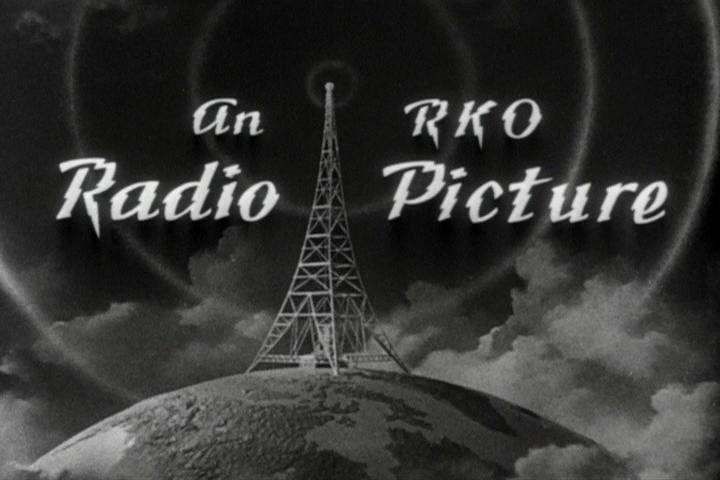
TENTATIVE SCHEDULE: Please read the class policies page now and read it carefully.
Screenings: R E1-E3 in Rolfs 115
January 8: In class Georges Méliès' A Trip to the Moon blu-ray with two soundtracks: restored hand-colored version contemporary soundtrack by Air, with noises; B&W version with piano track by Frederick Hodges and voices. Examples: The Phantom Carriage; The Man with a Movie Camera (KINO and BFI editions); Nosferatu (Eureka / KINO edition); Sergei Eisensten, Battleship Potemkin (KINO blu-ray), two soundtracks; Criterion Pandora's Box, four soundtracks.
January 10 In class Smashing Pumpkins, "Tonight, Tonight"; excerpts from Charlie Chaplin, The Gold Rush (silent and sound versions) and A Cottage on Dartmoor ( in this silent film, there is a scene of audience members watching a silent film with in a movie theater). Silent film in sound films: watching a silent film within a film--Hamlet's Mousetrap in Hamlet (dir. Michael Almereday, 2000); The Spiral Saircase; The Fall (2006 film); Sunset Boulevard; Jean-Luc Godard, Vivre sa Vie; Alain Resnais, Muriel.
Screening of Martin Scorcese, Hugo (2011), January 10, R E1-E3 in Rolfs 115
Optional: Monday, January 14 by 5 p.m.: Two discussion questions, numbered 1 and 2, on Martin Scorcese, Hugo (2011). Email (click here: [email protected]) your questions as an attachment in microsoft word with your first and last names at the bottom of the questions.
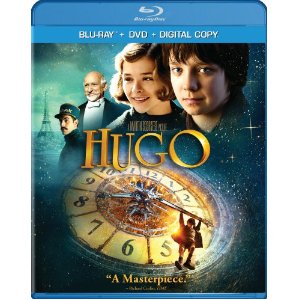
January 15 Audioclash 1: Martin Scorcese, Hugo (2011)
automatomania.co.uk / automaton / Georges Méliès "official" website / Harold Lloyd, Safety First!
Due Wednesday, January 16 by 8 p.m.: Two discussion questions, numbered 1 and 2, on Paolo Cherchi Usai, The Death of Cinema. (Click on the link to your left.)
January 17: Paolo Cherchi Usai, The Death of Cinema: History, Cultural Memory, and the Digital Dark Age.
Paolo Usai's film, Passio / Usai burns the negative
Screening January 17 R E1-E3 in Rolfs 115 of Michel Hazanavicius, The Artist (2011)

Due Monday, January 22 by 5 p.m.: Two discussion questions, numbered 1 and 2, on Michel Hazanavicius, The Artist. Email (click here: [email protected]) your questions as an attachment in microsoft word with your first and last names at the bottom of the questions. (That's not a typo in my first name.)
January 23 Audioclash 2: Michel Hazanavicius, The Artist (2011); love theme from Alfred Hitchcok's Vertigo (1958)
Two discussion questions on Sigmund Freud, "The Uncanny" due Wednesday, January 24 by 8 p.m. Email your questions in one word document (as an attachment) to me with your first and last names at the bottom of the document at [email protected]. (That's not a typo in first my name.)
January 25: Required Reading: Sigmund Freud, "The Uncanny"
Quiz in class on Basic Terms of Film Analysis
Screening January 25 Double Bill: Wim Wenders, Lisbon Story; Buster Keaton, The Cameraman
Due Monday, January 28 by 5 p.m.: FOUR discussion questions in total: two, numbered 1 and 2, on Wim Wenders, Lisbon Story (1994), and two questions, numbered 1 and 2, on Buster Keaton, The Cameraman (1928). Email (click here: [email protected]) your questions as an attachment in microsoft word with your first and last names at the bottom of the questions.
January 29: Wim Wenders, Lisbon Story; Buster Keaton, The Cameraman
Due Wednesday, January 30 by 8 p.m.: FOUR discussion questions in total: Two, numbered 1 and 2, on Paolo Cherchi Usai, The Death of Cinema. (Click on the link to your left; printed out pages will also be distributed in class) and and two, numbered 1 and 2, on Paolo Cherchi Uschai, Silent Cinema: An Introduction. Email (click here: [email protected]) your questions as an attachment in microsoft word with your first and last names at the bottom of the questions.
January 31 Reading: Paolo Cherchi Usai, The Death of Cinema and Paolo Cherchi Usai, Silent Cinema: An Introduction
Recommended Reading: Carlo Ginzburg, Clues
Screening January 31 F.W, Murnau, City Girl
Film Clip Analysis due February 2 by midnight. NOTE: Don't forget to put your name at the top of the document. (See Paper Guidelines.) Please send your paper to me as an attachment at [email protected]. (That's not a typo in my name.)
Due Monday, February 4 by 5 p.m.: Two discussion questions, numbered 1 and 2, on F.W. Murnau, City Girl (1930). Email (click here: [email protected]) your questions as an attachment in microsoft word with your first and last names at the bottom of the questions.
I assume you all are now clear that discussion questions are always due on Mondays by 5 p.m. and on Wednesdays by 8 p.m. So I will no longer indicate the due dates on this webpage.
February 5 Erasing Intertitles, F.W. Murnau,City Girl (1930)
February 7 Required Reading: Michel Chion, Film, a Sound Art (pages t.b.a.)
Screening February 7 Metropolitan Opera 2012 production of Wagner's Das Rheingold
February 12 Metropolitan Opera 2012 production of Wagner's Das Rheingold
February 14 Required Reading: Theodor Adorno, In Search of Wagner (pages t.b.a)
What is a film soundtrack? (Later, when we get to Chion: "Is there such a thing as a film soundtrack?")
Screening February 14 Phantom of the Opera (1925 / 1929 restoration)
February 19 Phantom of the Opera (1925 / 1929 restoration; Paolo Usai credited)
Recommended Viewing: silent film (home movie, 8 mm) as memory for amnesiac in Wim Wenders' Paris, Texas (1984) and the silent film documentary at the murder trial in Fritz Lang, Fury (1936)
February 21 Required Reading: Laurence Rickels, "Phantoms of Opera,” Art / Text. Vol. 63, 1998.
Recommended Reading:
In class clips: Wagner in film soundtracks: "Ride of the Valkyries" from Wagner's Die Walküre (The Valkyrie) in Francis Ford Coppola's Apocalypse Now; "Prelude" to Das Rheingold in the opening title sequence of Terence Malick's The New World; John Boorman's Excalibur (Malory's la morte d'Artur as Wagner's Götterdämmerung [Twilight of the Gods]); record of Tristan und Isolde in Fritz Lang, Blue Gardenia (1953).
Screening February 2: Alfred Hitchcock, The Lodger: A Story of the London Fog 1927 (BFI blu-ray, new orchestral soundtrack composed by Nitin Sawhney) 2012, Region B versus MGM DVD soundtrack (menu options for two orchestral soundtracks), National Film and Television Archive source print)
2008, Region 1 versus Network DVD soundtrack [no sound at all], BFI source print, 2008), Region 2
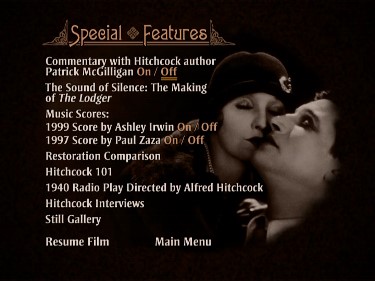
Silent Scream Queens: Scream versus Laughter
Notes on The Lodger as deaf cinema
February 28 Alfred Hitchcock, The Lodger (BFI blu-ray soundtrack versus MGM DVD soundtracks versus Network DVD no soundtrack, BFI source print)
Recommended, March 2: Richard Wagner, Parsifal (1880). Kundry's scream (twice) in Act II, screaming again and becoming mute in Act III. Metropolitan Opera Live HD production March 2, 2013 at Regal 14 Cinema
Not Exactly Recommended Reading: Laura Mulvey, "Visual Pleasures and Narrative Cinema," from Visual and Other Pleasures. Bloomington: U of Indiana P, 1987.
Carol l. Clover, “Her Body, Himself,” 1987, reprinted in Men, Women, and Chain Saws: Gender in the Modem Horror Film.
Highly Recommended Reading: Walter Benjamin, "The Work of Art in the Age of Its Mechanical Reproducibility" (three versions)
Screening February 28 (Double-Bill) Phantom of the Paradise (1974) (kitschy, parodic sequences modelled on silent films) and Brian de Palma, Blow Out (1981)
Cantata / Faust opera by Charles Gounod (same opera as in The Phantom of the Opera)
Recommended, Michel Chion,"The Screaming Point," in Audiovision.
First Paper (2000 words) due Saturday, March 2, by midnight. (Topics; you can't write on a film on which you did your film analysis).Please review the Paper Guidelines. Email (click here: [email protected]) your paper as an attachment in microsoft word with your first and last names at the top. Don't forget to give your paper a title.
Spring Break March 2-9
March 12 Phantom of the Paradise (kitsch parodic sequences modelled on silent films) and Brian de Palma, Blow Out
March 14 Required Reading: Theodor Adorno and Hanns Eisler, Composing for Films, pages 3-31; 54-61; 65-79. Light music. Background Music. "Easy" listening.
Screening March 14 Wagner in Cinema, Redux:
Lars von Trier, Melancholia ("Prelude" from Tristan und Isolde)

March 19 Lars von Trier, Melancholia ("Prelude" from Tristan und Isolde at the beginning and the ending of the film)
March 21 Michel Chion, FiIm, A Sound Art (pages t.b.a.) Counterpart / Sonata ; Bach / Mozart ; melody / harmony
Blindness as Audioclash: In class excerpts from Derek Jarmen's Blue; Roman Polanski's The Tenant dubbed in French and in English on reverse sides of the DVD; Abbas Kiarostami, Where is my Romeo?
March 21 Screening Alfred Hitchcock, Blackmail (sound and silent versions)
March 26: Alfred Hitchcock, Blackmail, both silent and sound versions (differences between versions; [close up of police car hub caps as playing vinyl record--the wheels of justice get black flat tires that look like (criminal) records. In class clips from Hitchcock's first film, Downhill, of a whistle being blown in a soccer game and of a record playing during an hallucination sequence. We will watch the Network edition DVD of this silent film; the DVD doesn't give the film a soundtrack.
March 28 Required Reading: Michel Chion, FiIm, A Sound Art (chapter 14-16 and 25.)
Screenings March 28: Comparative Film Philology: Everyone will watch the most recently restored version on blu-ray at the screening, Fritz Lang, The Complete Metropolis; additionally, one half of the class will watch the previously restored verion, and the other half of the class will watch the 1984 Giorgio Moroder version). Everyone will have watched two out of the three versions before we meet in class to discuss them.

Fritz Lang, The Complete Metropolis (Most Recently Restored Authorized Edition)

Fritz Lang, Metropolis (Most Recently Restored Authorized Edition)

Fritz Lang, Metropolis, Giorgio Morodor 1984 soundtrack
April 2 Fritz Lang, Three Metropolis restorations compared philologically in class.
Recommended: Liner Notes on Restorations of Berlin, die Sinfonie der Großstadt / Melodie der Welt (2 DVDs)
Walther Ruttmann (Regisseur)
Screening April 4 Carl Dreyer, Passion of Joan of Arc, two film projection speeds (20 and 24 frames per second) and two soundtracks in the Masters of Cinema blu-ray edition; in class comparison with the two soundtracks on the Criterion DVD edition, and Jean-Luc Godard, Vivre sa vie (Her Life to Live)
 |
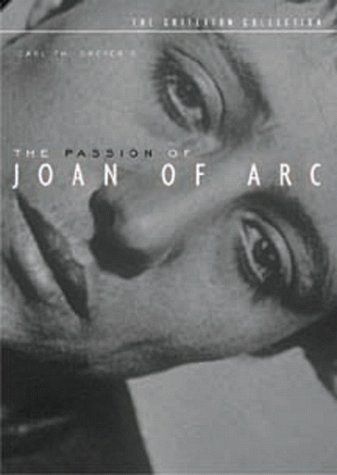 |
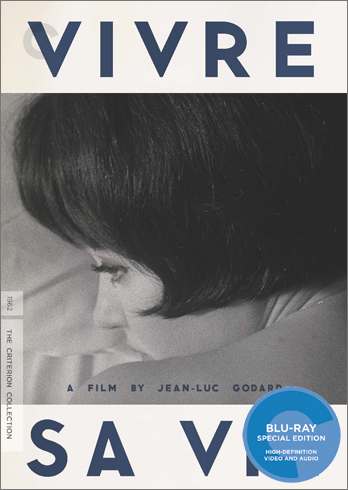 |
April 9 Carl Dreyer, Passion of Joan of Arc, Masters of Cinema blu-ray and Criterion DVD editions and clip in Godard's Vivre sa Vie when Nana and her john go to see Dreyer's Passion of Joan of Arc.
Stills from the Criterion and MofC DVDs
Screening April 11 The Jazz Singer blu-ray (2013)
April 11 Required Reading: Michel Chion, Film, A Sound Art Chapter 26
Recommended: pdf here of Michel Chion's chapter, "Phantom Audio-Vision" from AudioVision(partly on The Invisible Man)
April 16 The Jazz Singer blu-ray (2013)
Recommended: Entuziazm (Simfonija Donbassa) (2 DVDs) Dziga Vertov (restored and unrestored versions)
April 18 Paolo Cherchi Usai, David Alexander Horwath, Michael Loebenstein, ed. Film Curatorship: Museums, Curatorship and the Moving Image (pp. 8-27 and chapter three, pp.107-29)
FINAL SCREENING From Woman's Sream in Opera to Woman's Voice / Song in Film Musical: Singing in the Rain
April 23 Singing in the Rain; Class discussion; Course evaluations
Second, Final Paper (Topics t.b.a.) (2000 words) due in class, April 23. Please bring a hard copy of your paper to class and email an electronic copy of your paper to me.
From scream to song to "shh."

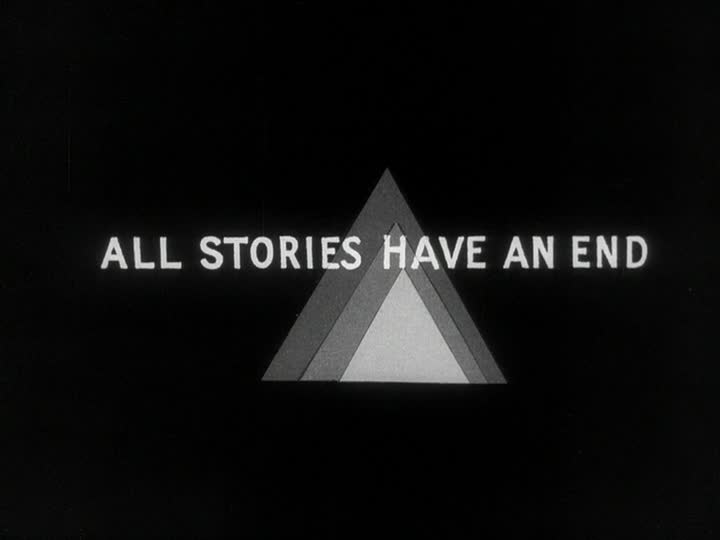

Shh! It's "The End!"
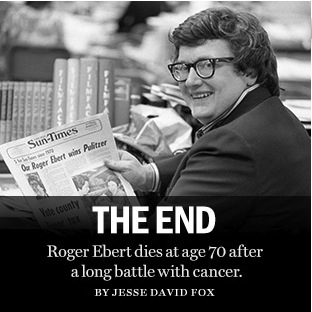

"Shh" in Silent Movie (1976)
Silent "Shh" in Sinister (2013)
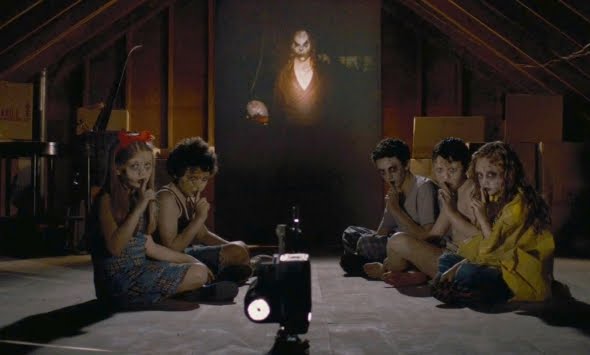



(Parsifal: Ein Bühnenweihfestspiel / opera / operetta / opera buffa / film musical)
See Mladen Dolar, Opera's Second Death on opera buffa.
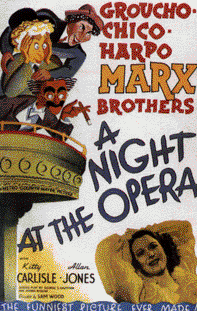
ALL sreenings are on R, periods E1-E3, in Rolfs 115
(Please expect changes to be made in the schedule from time to time during the semester--they will be announced well ahead of time both in class and by email).
Please turn off your cell phones and computers before class. Take notes with paper and pen or pencil.
If you are late to class, or if you leave during class, or if you leave class early, I will count you as absent. If you don't turn in the discussion questions (when they are due), I will also count you as absent. You are allowed two absences without excuse or penalty. For more details, see the class apolicies webpage.
So that we can quickly google information as needed during class, I will ask a different student at each class meeting to sit next to the class computer and serve as our technical assistant.
All films are screened Thursday evenings, periods E-1-E-3 and will be discussed in class the following Tuesday.
Two students will co-lead class discussion each Thursday on the film screened the preceding Wednesday, periods 9-11. Two students will also lead class once on a Tuesday (on the assigned readings).
Because this is a senior level film course, not an introductory lower divison course, I expect to become familiar with the basic terms of film analysis by th end of hte second week of the semester. YALE FILM STUDIES' Film Analysis Web Site 2.0 is a great resource to learn how to watch films critically. Check it out so that you can learn the basic terms of film analysis and become increasingly conscious of the soundtrack, camera angles, lighting, focus, film stock (color or b&w), length of take, editing, and so on all make up a film's formal design. By learning the basics of film analysis, you can learn how to "read" films as closely as you have been learning to read literature. In both cases, you want to read the the story in relation to its specific medium (film) and with close formal attentiveness. Paying careful attention to a small part or parts of a film can tell you a lot about the whole film.
Assignment for each class: Two discussion questions, numbered 1 and 2 and with your name at the bottom of the document, on each assigned reading and film are due by 5 p.m. on Mondays and two discussion questions, numbered 1 and 2, on each assigned reading are due by 8:00 p.m. on Wednesdays. Email your questions in one word document (as an attachment) to me at [email protected]. (That's not a typo in my name.)
BIG WORDS AND CRITICAL TERMS (JARGON):
Many of the readings will be difficult, partly because the vocabularies the writers use contain technical terms (jargon) you probably won't know as well as "big words" you may not know. Since you can easily go to wiktionary to look up the meanings and etymologies of words you don't know, I ask that you include at least one word you had to look up with your discussion questions. That will help everyone in the class. And since this is an English class, you should want to expand your vocabulary, no? :)
, perhaps with the audiocommentary playing. Or René Clair, À nous la liberté (English: "Freedom for Us") (recording industry), or René Clair, Sous les toits de Paris (Under the Roofs of Paris), or René Clair, Prix de beauté, or Jean Vigo, L'Atlante; phantom of . . . / or? . . . . Rene Clair, À nous la liberté (English: "Freedom for Us")
Sychronizing the Scream:
Charlie Chaplin, Modern Times
Rene Clair, Underneath the Roofs of Paris
Rene Clair, Le Million
Billy Wilder, Sunset Boulevard (silent film as outmoded)
Powell and Pressburger, Peeping Tom (silent b& w films of childhood)
Foreign language subtitles as text
Sanchez, Casa de mi Padre, "I don't speak American" (Note director made me write about the animals scene). Where does text go in sound film? Reading subtitles--hard of hearing, foreign language
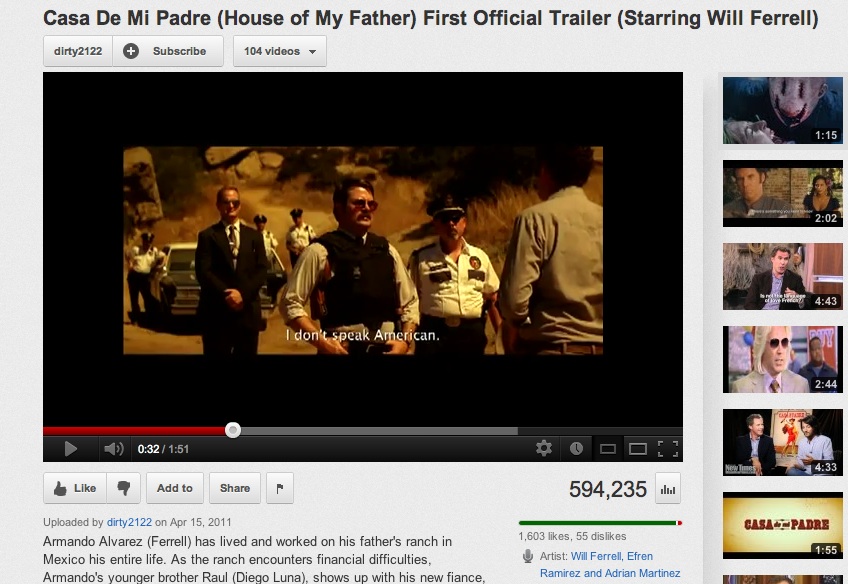
Woody Allen, What's Up Tiger Lilly?
Fritz Lang, Fury (the silent film documentary at the trial) and Beyond a Reasonable Doubt (radio, electricity, telephones and evidience)
Jean-Luc Godard, Vivre sa Vie
Carl Dreyer, Passion of Joan of Arc
The girlfriend listening to the tape on headphones so that we ca't hear it scene in Werner Herzog's Grizzly
Fritz Lang, M
-------, Testament of Dr. Mabuse
Liliom two vesions of film of his life, first with regular sound, second with sound of his inner thoughts
Sound of the carousel
--Silence d'Or
The Rules of the Game (radio)
Subtiling and dubbing, Woody Allen, What's Up, Tiger Lily?
Synchronizaiton of sound circa 1929
Sound Design
Coppola Apocalypse Now Redux
Surround sound
Film Restoration
DVDs of silent films with two to four soundtrack options.
Silent film soundtrack resotrations / new soundtracks
Phantom Carriage (deliberately anachronistic)
Hitchcock ,The Lodger--no soundtrack at all
Contemporary soundtracks for silent films:
solo piano or organ
Voice overs Night and the City
Female versus male voice overs in film noir
Audiocommentaries on DVD versus notes on film to be read silently as apratexts. like on treasures from the American Archive IV versus Seeing Oneself with one's Own eyes, and Brakage cmemntary
Kenneth Anger, Scorpio Rising with and wihout commentary--music as satire
Lynch, Blue Velvet--Roy Orbison's "The Sandman" lip synching scene
The Game (silent color film of childhoood)
Avant-garde film and animation:
Steamboat WIlly
Emile Cohl
: In class clips from
Screening January 7:
January 8:
PLEASE BE SURE TO BRING COPIES OF THE TEXTS WITH YOU TO CLASS. Please note: if you don't bring the assigned readings with you, I count you as absent. Only two absences are allowed without penalty.)
Muteness: La Silence de la Mer
Sign Language: Walkabout
Mime: Children of the Pardise
Radio On
Border radio
Godard, Pierrot le Fou
We will also turn our attention from time to films that are "about" the transition from silent to sound cinema in 1929. Films may include Alfred Hitchcock (sound and silent versions) Blackmail; A Cottage on Dartmoor; Billy Wilder, Sunset Boulevard; Jean Renoir, Rules of the Game; Rene Clair, Le Million, A Nous la Liberte, and Under the Roofs of Paris, Charlie Chaplin, Modern Times; Fritz Lang, M; Jean-Luc Godard, Vivre sa Vie.